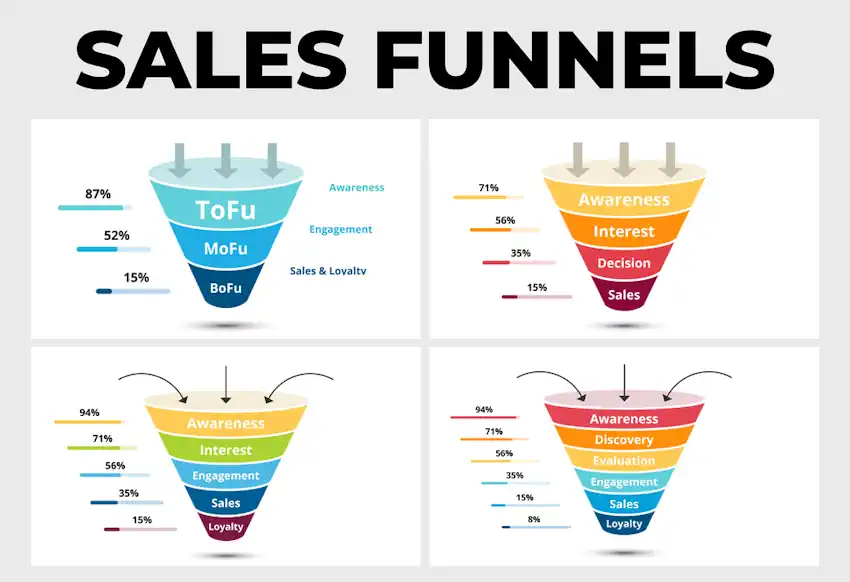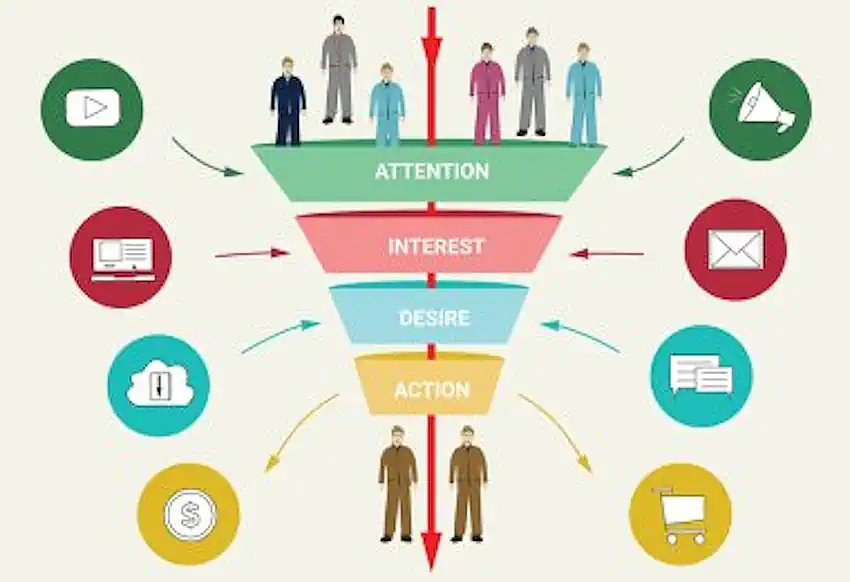In today’s digital landscape, creating an effective marketing funnel is crucial for business success. Many entrepreneurs, particularly those just starting out, struggle to create and implement an effective funnel system that converts visitors into customers. As a funnel development specialist, you can help entrepreneurs transform their online presence into a streamlined sales machine that consistently converts prospects into loyal customers. This guide will show you how to build and optimize marketing funnels that drive real results for your clients.
The Value of Marketing Funnel Services
By offering marketing funnel development services, you help entrepreneurs turn their prospects into paying customers through a structured, automated process. Many entrepreneurs struggle with converting leads into sales because they lack a clear path that guides potential customers from initial awareness to making a purchase.
You solve this problem by designing and implementing effective marketing funnels that lead to higher conversions, improved customer engagement, and increased revenue. These funnels allow entrepreneurs to focus on growing their business while you handle the strategic setup that drives results.
Understanding Client Needs and Target Audience
Your process begins by understanding the entrepreneur’s business goals and target audience. Every marketing funnel needs to be tailored to the specific needs of the business and its customers.
Whether the goal is to sell a product, offer a service, or grow an email list, knowing the target audience’s pain points and desires is essential. You’ll collaborate with the entrepreneur to identify what stage their prospects are in, whether they are just becoming aware of the product or are close to making a purchase. This insight allows you to build a funnel that aligns with their customer’s journey and encourages action at each step.
Building the Marketing Funnel
A successful marketing funnel requires careful attention to each stage of the customer journey, from initial awareness to final conversion.
Top of the Funnel (TOFU)
A successful marketing funnel is divided into distinct stages: awareness, interest, decision, and action. You’ll start by creating content for the top of the funnel (TOFU) that attracts potential customers.
This content might include blog posts, social media posts, videos, or ads that introduce the brand and provide value without being overly salesy. The goal is to generate awareness and interest in the product or service. You’ll craft this content to be informative, engaging, and tailored to the target audience, ensuring it speaks directly to their needs or problems.
Lead Generation and Capture
Once potential customers are aware of the brand, the next step is moving them down the funnel to the consideration stage. At this point, you’ll design lead magnets or offers that encourage prospects to provide their contact information, such as email addresses, in exchange for something valuable.
This could be a free eBook, checklist, webinar, or discount code. These lead magnets are strategically placed on landing pages or pop-up forms, where visitors can easily opt-in. By capturing leads, you help entrepreneurs grow their email list and start nurturing those prospects through email marketing.
Middle of the Funnel (MOFU)
The middle of the funnel (MOFU) focuses on nurturing leads and building trust. You’ll set up automated email sequences that deliver targeted content based on the lead’s behavior and interests.
These emails could include educational content, case studies, testimonials, or offers that highlight the benefits of the entrepreneur’s product or service. Your goal is to keep the leads engaged, answer any objections they might have, and guide them closer to making a purchase. A well-crafted email sequence ensures that the brand stays top-of-mind while delivering value to the leads.
Bottom of the Funnel (BOFU)
At the bottom of the funnel (BOFU), the focus shifts to conversion. You’ll design compelling offers, such as limited-time discounts, free trials, or bundled packages, to encourage leads to make a purchase.
This stage requires clear, persuasive messaging that emphasizes the product’s value and addresses any final concerns. You’ll also set up landing pages with strong calls to action (CTAs) that make it easy for leads to complete the purchase.
These pages should be optimized for conversions, with a focus on simplicity, clarity, and ease of use. By streamlining the decision-making process, you help entrepreneurs close more sales and increase revenue.
Post-Purchase Strategy
Follow-up is another critical component of a successful marketing funnel. Even after a sale is made, you’ll help entrepreneurs continue nurturing relationships with their customers through post-purchase emails, upsell offers, and loyalty programs.
This not only increases customer retention but also creates opportunities for repeat sales and referrals. By building trust and maintaining communication after the initial purchase, you help entrepreneurs turn one-time buyers into loyal customers who advocate for their brand.

Optimization and Analysis
Continuous monitoring and improvement are essential for maintaining an effective marketing funnel.
Analytics and Tracking
Analytics and tracking are essential to understanding how well the funnel is performing. You’ll monitor key metrics such as conversion rates, click-through rates, and customer lifetime value (CLV) to determine where the funnel is succeeding and where adjustments need to be made.
Using tools like Google Analytics, email marketing platforms, and CRM systems, you’ll analyze the data to identify bottlenecks or drop-off points in the funnel. This allows you to make data-driven decisions, optimize each stage of the funnel, and improve overall performance.
A/B Testing
A/B testing is another valuable strategy you’ll implement to optimize the funnel. By testing different elements—such as headlines, CTAs, email subject lines, or landing page layouts—you can identify which versions perform best.
A/B testing helps you refine the funnel over time, ensuring that it delivers the highest possible conversion rates for the entrepreneur. Even small adjustments, like changing the wording of a CTA or the color of a button, can lead to significant improvements in performance.
Automation and Systems
Automation is key to making the funnel run smoothly without constant manual intervention. You’ll set up automation tools, such as email autoresponders, CRM integrations, and sales tracking systems, to ensure the funnel operates seamlessly.
Once the funnel is in place, it runs on autopilot, allowing the entrepreneur to focus on other areas of their business while the funnel continues to attract leads and generate sales. Automation saves time and resources, making the funnel a scalable solution for long-term growth.
Customization and Pricing
Marketing funnels are not one-size-fits-all, so customization is important. You’ll tailor each funnel to the specific needs of the entrepreneur’s business, whether they’re selling high-ticket consulting services or affordable digital products.
Customization ensures that the messaging, offers, and content are aligned with the entrepreneur’s brand and resonate with their target audience. This personalized approach leads to higher engagement and better results.
Pricing your services can depend on the complexity of the funnel and the level of customization required. You can offer packages that include funnel strategy, content creation, email marketing setup, and landing page design.
For more advanced funnels, you might include ongoing management, A/B testing, and optimization services. Offering tiered pricing allows you to cater to different types of entrepreneurs, from those who need a basic funnel to those who require a more sophisticated, multi-step system. Charging a one-time fee for funnel setup or offering a retainer for ongoing management provides flexibility and recurring revenue.
Is Marketing Funnel Development Right for You?
Before jumping into this business opportunity, it’s important to assess whether marketing funnel development aligns with your skills and interests. This business might be perfect for you if:
1. You’re someone who enjoys analyzing data and using insights to make strategic decisions. Marketing funnel development requires a keen eye for metrics and the ability to interpret what they mean for business growth.
2. You have strong organizational skills and enjoy creating systematic processes. Building effective funnels requires careful planning and attention to detail in mapping out each step of the customer journey.
3. You’re interested in psychology and understanding what motivates people to take action. Success in funnel development comes from understanding human behavior and decision-making patterns.
4. You like combining creativity with technical skills. The best funnel developers balance creative content creation with technical implementation of automation tools and tracking systems.
5. You enjoy helping others achieve tangible results in their business. There’s significant satisfaction in seeing your clients’ conversion rates improve and their businesses grow through your work.
6. You’re comfortable working with various digital marketing tools and are willing to keep learning as technology evolves. The field requires familiarity with email marketing platforms, landing page builders, and analytics tools.
Getting Started in Funnel Development
Here are the essential first steps to launch your marketing funnel development business:
1. Start by mastering one or two popular platforms for building funnels. WordPress with funnel-focused plugins is a versatile choice used by many businesses, while platforms like ClickFunnels, Shopify, or Wix offer specialized funnel-building features. Choose platforms based on your target clients’ needs – WordPress for flexibility and customization, Shopify for e-commerce funnels, or dedicated funnel builders like ClickFunnels for specific functionality. Focus on becoming proficient with their features and understanding how to optimize them for different business needs.
2. Create a demonstration funnel for your own business. This serves two purposes: it helps you practice your skills and serves as a portfolio piece to show potential clients. Make sure to document your process and results.
3. Develop a basic service package that includes funnel strategy, setup, and optimization. Consider offering a specialized package for a specific industry or type of business to differentiate yourself in the market.
4. Build relationships with complementary service providers, such as copywriters, graphic designers, and paid advertising specialists. These connections can lead to referrals and allow you to offer more comprehensive solutions to your clients.
5. Join online communities where your target clients gather, such as entrepreneurship forums or business Facebook groups. Share valuable insights about funnel development to establish your expertise and attract potential clients.
6. Create case studies from your demonstration funnel and any initial client projects. Document specific metrics and results to show the concrete value you can provide to future clients.
7. Consider offering a limited-time promotional rate for your first few clients in exchange for testimonials and detailed case studies. This helps you build social proof while gaining valuable experience.

Your Path to Success in Funnel Development
Developing marketing funnels for entrepreneurs is a highly valuable service that directly impacts their ability to generate leads and increase sales. By creating and managing the entire funnel process—from awareness to conversion—you provide a structured, automated system that drives results.
With your expertise in crafting engaging content, optimizing each stage, and implementing automation, you help entrepreneurs grow their business more efficiently while building a profitable freelance business for yourself.




